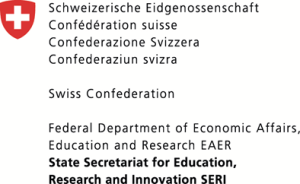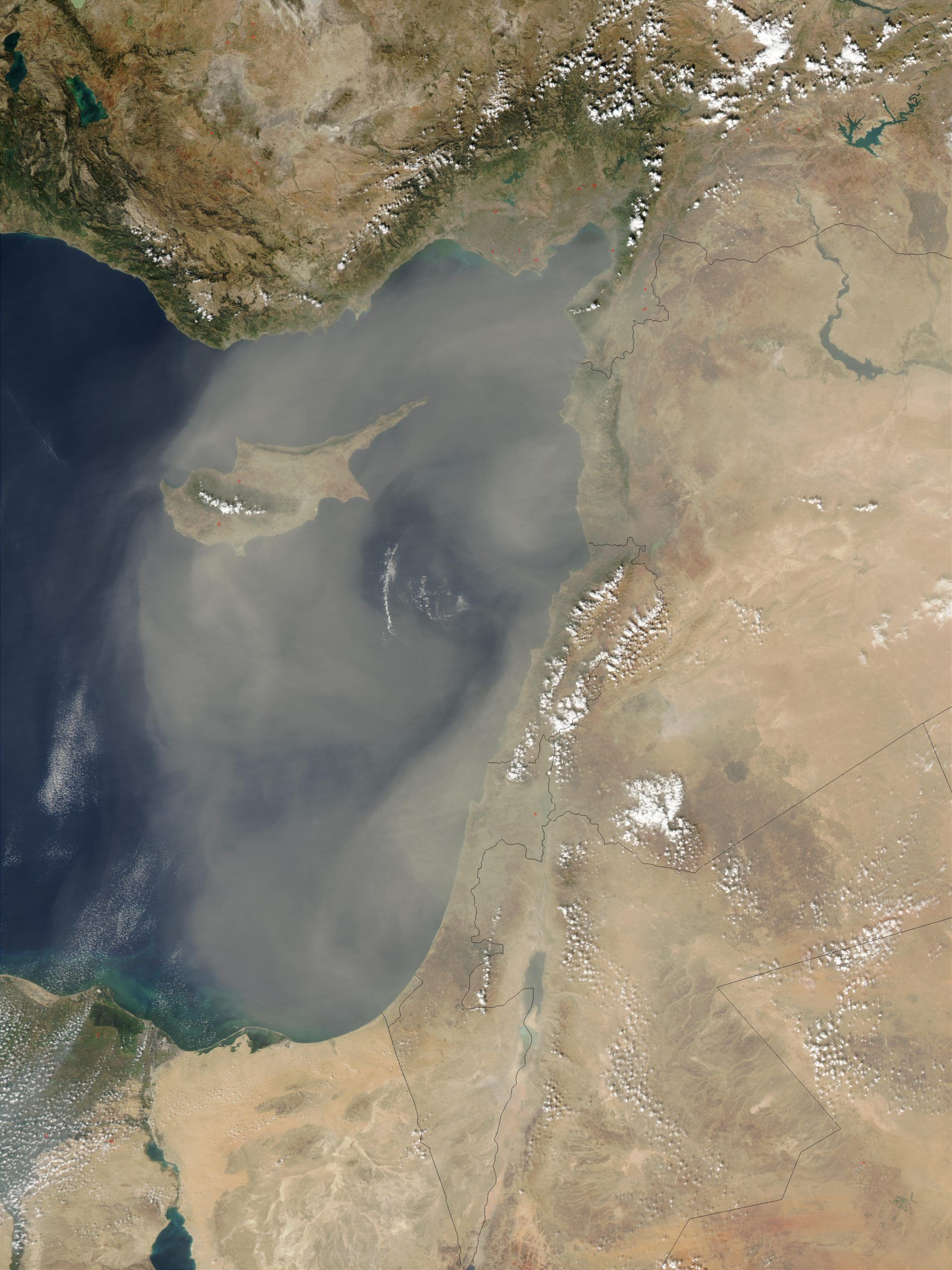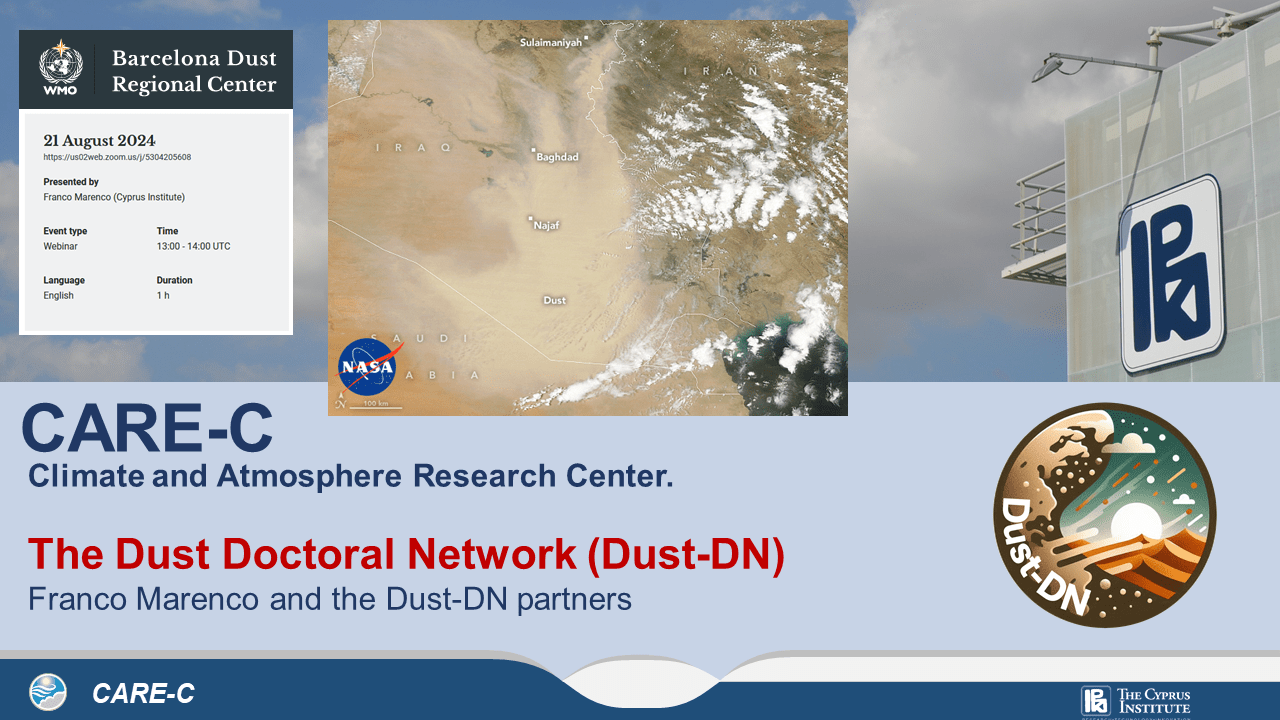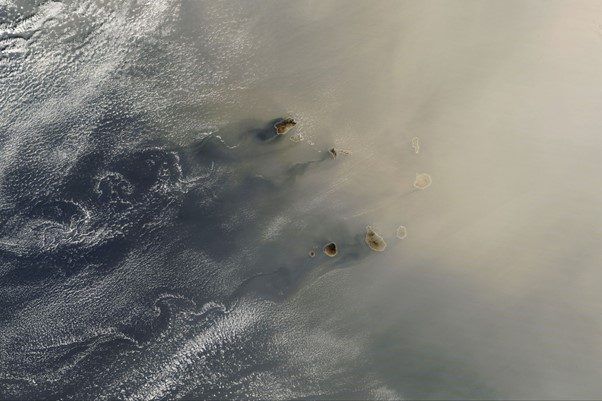Dust-DN doctoral network – DC6
University of Évora (UÉ)
Supervisors: Paulo Canhoto and Stelios Kazadzis
The Dust-DN doctoral network
Atmospheric dust or mineral dust (or simply “dust”) is a major atmospheric aerosol, and it gives us one of the most visible and detectable aspects of transboundary transport of atmospheric constituents, impacting visibility, radiation and climate. What is less evident are its quantitative impacts on health, transportation and energy production. Atmospheric dust is not fully understood at the fundamental level (microphysical properties, dust emissions, source regions) and hence atmospheric models fail to fully reproduce its impacts. Moreover, dust observations using ground-based instrumentation, remote sensing and aircraft are abundant, but not evenly distributed; in particular they are missing near the major dust sources. Moreover, the techniques are still under development, with each giving a different picture of a phenomenon with multiple facets. For example, it is now known that super-coarse and giant dust particles have gone undetected for a long time due to limitations in the measurement and modelling tools that have been in use for decades, and this misdetection alters the understanding and the prediction of a number of processes. Finally, dust affects the environment, society, and several economic sectors, with impacts on the transportation and energy sectors for example, the nature and cost of which is not fully understood and quantified. Several methodologies exist to study mineral dust, each giving its own differing picture of a complex phenomenon: numerical modelling, remote sensing, in-situ observations, laboratory research.
We establish the Dust Doctoral Network (Dust-DN), in order to address gaps in the understanding of dust and its impacts by linking the different disciplines and methods. The aim is to train a team of early career scientists into overcoming compartmentalism in this field of science, and into developing a multi-disciplinary approach to mineral dust. Dust-DN will set up a network of academic and non-academic partners working on different aspects of dust research, and will coordinate a program of doctoral projects that will enhance knowledge across a broad range of fundamental, but linked, components of the atmospheric dust life cycle and its impacts. The projects will span across the disciplines of atmospheric sciences (dust processes, modelling, and remote sensing), geology (dust emissions and source regions), as well as the impacts on society and economic sectors. The knowledge will be shared among participating institutions and the wider public and scientific community. Common activities will be held, so as to enhance the network among the partner institutions and among the doctoral researchers, delivering an ambitious advanced training program for capacity building.
The University of Évora
The University of Évora (UÉ) in Portugal is a public institution organized into five schools: Sciences and Technology, Fine Arts, Social Sciences, Health and Human Development, and Nursing. Also, within the UÉ, the Institute for Advanced Studies and Research (IIFA) serves as a crucial unit, merging teaching with research to foster interdisciplinary knowledge and support existing R&D units. IIFA coordinates 35 PhD programs and two Erasmus Mundus Master programs, ensuring an integrated advanced training environment and offering a wide range of soft skill training. IIFA also oversees 19 research centres, funded by the PT Foundation for Science and Technology (FCT). One of these R&D units is the Institute of Earth Sciences (ICT), a multidisciplinary team focusing on Earth System Science and Energy. This team is transitioning to the newly established Centre for Sci-Tech Research in Earth System and Energy (CREATE) also supported by the FCT. CREATE emphasizes integrated research on critical Earth System and Energy challenges, along with technological innovation. It comprises 121 members, including 48 integrated PhD researchers and 39 PhD students.
The selected candidate will be working at the ICT/CREATE R&D units of UÉ, gaining access to several observational platforms for atmospheric research in southern Portugal. These platforms include the Évora Atmospheric Sciences Observatory, the Alqueva Lake floating station, oceanic sites at Cabo da Roca and Sines, a mobile air quality platform, and regional networks of weather and solar radiation (BSRN compliant) stations. The team also coordinates specialized research labs in Precision Optics, Atmospheric Physics, Solar Radiation Sensors, Thermofluids & Energy, Bioaerosol & Aerobiology, and Health & Environment. Additionally, a computational cluster with 512 processing cores and 1TB of RAM distributed over eight nodes is available for research purposes. Researchers at all stages of their careers find at ICT/CREATE a dynamic and friendly environment, where personal relationships easily thrive in an inclusive atmosphere, and flexible work planning promotes a life beyond work.
The PhD project
Doctoral Candidate 6 (DC6) – “Modelling and assessment of the impact of atmospheric dust on solar resource for energy applications”
Enrolled in the University of Évora’s PhD programme on “Earth and Space Sciences”.
This project has the objective of developing new parameterizations for Direct Normal Irradiance (DNI) and Circumsolar Normal Irradiance (CSNI) under extreme atmospheric dust conditions, for assessment of power generation impact. The candidate will make use of radiative transfer codes and dust properties obtained from remote sensing methods (e.g. AERONET), to model the DNI and CSNI. On the other hand, the candidate is expected to develop a prototype pyrheliometer with variable field of view (FOV) for quantification of CSNI. Results will be validated at PMOD/WRC and against Baseline Surface Radiation Network (BSRN) data. The work includes the evaluation of transposition models for Global Tilted Irradiance (GTI) and the proposal of enhanced parametrizations for CSNI and GTI. Finally, the candidate will assess the impact of extreme dust events on solar energy generation, including a financial risk analysis for selected regions in the Mediterranean and Middle East. The doctoral candidate will be based at UÉ in Évora, Portugal and will be supervised by Prof. Paulo Canhoto (UÉ) and Doctor Stelios Kazadzis (PMODWRC). Prof. Maria João Costa (UÉ) will also contribute to the supervision. The project will include planned secondments at the Physikalisch-Meteorologisches Observatorium Davos/World Radiation Center (Switzerland) (7 months in the beginning of the second year), the Ciemat – Plataforma Solar de Almería (PSA) (Spain) (1 month in the beginning of the third year), and Earnst and Young (EY) (Cyprus) (2 weeks in the middle of the third year).
Details
The recruited PhD candidate will be enrolled in UÉ’s PhD programme on “Earth and Space Sciences” and is included in the “Dust Doctoral Network”, which involves highly prestigious research groups on this scientific topic, and which will ensure that the cohort of doctoral candidates is integrated in a dynamic and enthusiastic scientific environment. The doctoral candidate will learn about the consortium partners’ unique facilities and research topics/methods, and will exploit these opportunities for their research. All Dust-DN doctoral candidates will work side-by-side with lead scientists at world-leading institutes, and they will:
● Take responsibility for the scientific project that they are involved in, and the instruments and/or softwares required.
● Collect scientific knowledge through experiments and/or radiative transfer modelling.
● Develop tailor-made data processing methods.
● Advance the fields of research in atmospheric dust and/or the related measurement techniques.
● Participate in the Dust Doctoral Network training and networking activities
● Publish the results of the research in scientific peer reviewed journals, and present at conferences and workshops.
● Participate in field experimental campaigns.
Qualification Requirements
● The candidates are required to have an excellent master’s degree (or equivalent) in physical, engineering or mathematical sciences or other related subjects (e.g. natural science disciplines) and to not have any kind of PhD degree
● Motivation for research on atmospheric dust.
● Experience or aptitude to develop scientific software (computer-based programming)
● Demonstrated ability in being a strong team player.
● Strong international mobility for the purpose of research, training, and dissemination is mandatory.
Preferred Qualifications
Additional appreciated skills and competencies are:
● Experience in applying broad scientific knowledge to a range of specific problems or scenarios.
● Previous research experience and/or previous interest in the atmospheric sciences, meteorology, solar energy or closely related disciplines will be appreciated.
● Experience with written or oral communications.
● Fluency in written and oral English is highly valued.
● Publication record.
● Driving licence.
Eligibility Requirements
· Qualifications: The candidate must hold a title satisfying the admission requirements for a doctoral candidate at the institution where they will be enrolled (see qualification requirements). A doctoral degree in any field is not compatible with these positions.
· Mobility: Transnational mobility is an essential requirement of MSCA Doctoral Networks. At the time of recruitment, the candidates must not have resided or carried out their main activity (work, studies, etc.) in Portugal for more than 12 months in the 3 years immediately prior to the recruitment date. Applicants must be aware that seconding periods are planned for this position as described above. International applicants are welcomed.
Rights and Responsibilities of Researchers Participating in Marie Skłodwska-Curie Actions
The European Charter for Researchers is a set of general principles and requirements which specify the roles, responsibilities and entitlements of both researchers and the employers and/or funders of researchers. The aim of the Charter is to ensure that the nature of the relationship between researchers and employers or funders is conducive to successful performance in generating, transferring, sharing and disseminating knowledge and technological development and to the career development of the researchers.
It is obligatory for applicants to read and understand the detailed information regarding the rights and responsibilities of researchers engaged in an MSCA Doctoral Network.
The European Charter for researchers can be accessed at: https://euraxess.ec.europa.eu/jobs/charter/european-charter
Employment Contract and Financial Aid
The selected candidate will be appointed under a 36-months full-time employment contract. A competitive financial aid package will be offered to the successful candidate with a gross annual salary of €35,246 (living allowance and mobility allowance). In addition, there can be further allowances depending on family status and other needs, as per MSCA relevant provisions.
It is understood that failure to successfully continue the PhD program will result in immediate cancellation of the employment contract and the financial support provided.
Start date
The position starts on 3 February 2025 and is a full-time position (40 hours/week), funded for a period of 36 months.
Application and selection
Application advisory: A pre-screening of the candidates will be made by the Dust-DN consortium as a first step prior to the formal recruitment process. Candidates should submit a CV and motivation letter on the Dust-DN website, together with their university transcripts and the name and contact information of two referees, and indicating up to 3 preferred doctoral projects (in order of preference) amongst the ones advertised within the whole Dust-DN (which includes the one in the present advert). It is very important that the motivation letter should recall each of the qualification requirements and preferred qualifications indicated in this advert, clearly justifying how the candidate is able to meet each of them, and providing evidence. After short-listing, the most suitable candidates will be called for an interview.
Formal recruitment phase: The most highly-ranked applicants interviewed during the application advisory phase will be re-directed for the formal application.
With the submission of the documents, applicants agree that the documents will be shared among all supervisors of the Dust-DN consortium and members of the respective shortlisting and interviewing panels.
Dust-DN respects and supports the compatibility of professional and private life and promotes development opportunities for its cohort of doctoral researchers. We promote equality of opportunity, value diversity and nurture a working and learning environment.
Deadlines:
Applications for the advisory phase must be submitted by 31 August 2024.
Deadline extended to 30 September 2024
Formal applications must be submitted by 30 November 2024.
We reserve the possibility to extend the deadline(s) if not enough candidates apply.
Contact Information
For further information, please contact Professor Paulo Canhoto (e-mail: canhoto@uevora.pt).
Apply Now







